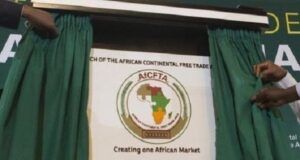Secretariat operationalises AfCFTA Adjustment Facility
 The African Continental Free Trade Area (AfCFTA) Secretariat has packaged a private sector engagement plan in partnership with the MasterCard Foundation to enhance private participation in African economic development.
The African Continental Free Trade Area (AfCFTA) Secretariat has packaged a private sector engagement plan in partnership with the MasterCard Foundation to enhance private participation in African economic development.
The plan focuses on four initial priority sectors or value chains, namely agro-processing, automotive, pharmaceuticals, and transportation and logistics for quick wins, based on the potential for import substitution and existing production capabilities on the continent.
Mr Wamkele Mene, Secretary-General of AfCFTA Secretariat, speaking at the Chatham House Members Event, said the Secretariat also in partnership with the Afreximbank, was finalising arrangements for the operationalisation of an AfCFTA Adjustment Facility.
The event was on the theme: ““Implementing the African Continental Free Trade Area: priorities and prospects.”
The Facility will provide a mechanism for Member States to access financial and technical resources to implement the Agreement and mitigate the short-term disruptions and associated costs.
He said in February, the Secretariat signed a $10 billion AfCFTA Adjustment Fund Management Agreement in Cairo, Egypt.
The signing was to pave way for the operationalisation of the Adjustment Facility to enable countries access the funds subject to certain criteria.
“The Afreximbank, which is the Fund Manager, has made available an amount of $1 billion as base capital that will leverage other international funding sources to support the adjustment facility,” he added.
The Secretary-General said another important milestone was the development and commercial launch of the Pan-African Payments and Settlement System (PAPSS), one of the operational instruments of the AfCFTA, in Accra, on January 13, 2022.
The PAPSS is a platform that will facilitate cross-border payments in local African currencies and is set to boost intra-African trade significantly by minimizing the use of hard currencies and making cross-border payments cheaper and seamless.
He said it would significantly reduce the costs of currency convertibility and save the continent an estimated $5 billion annually, to the benefit of the numerous SMEs and young entrepreneurs across the continent.
Source: GNA
